Since launching in 2014, Veganuary has established itself as a key date in the calendar. But this year, activity is more muted. So does Veganuary need to adapt to a new environment? And what does it say about the future of plant-based?
This month, millions of people across the globe will be leaving lamb and forsaking fish as they attempt to stick to a vegan diet for the whole of January. Veganuary – launched in 2014 as a means of raising awareness and driving trial of plant-based – has established itself as a cultural phenomenon.
An estimated 25 million people took part last year, and organisers expect numbers to be “even bigger” in 2025. However, times have changed since Veganuary first stormed on to the scene over 10 years ago.
Today, plant-based is far more mainstream – and products are often finding their greatest appeal among flexitarians, rather than strict vegans. The ultra-processed food (UPF) debate has also hit the category hard and, coupled with cost of living concerns, it’s fuelled two years of falling volumes and high-profile casualties such as Allplants, VBites and Meatless Farm.
For certain brands, looking beyond Veganuary is key to bolstering the category. Elin Roberts, co-founder & co-CEO at tempeh brand Better Nature, says the brand won’t be talking about Veganuary this year “because we think the conversation is changing”.
And multiple onlookers believe Veganuary may have peaked in the UK around 2020-22, during the pandemic.
“Veganuary certainly has a role to play in keeping up awareness of plant-based food and its benefits”
Elin Roberts, Better Nature
So, over 10 years since its establishment, how important is Veganuary today? Does its messaging need a rethink, especially in the wake of the UPF debate? What does the future hold for the plant-based category – and what part does Veganuary play in that?
One thing everyone agrees on is the impact of Veganuary in raising awareness of plant-based. It’s been “huge”, says Roberts. “The stats speak for themselves: more than 75% of Brits have heard of Veganuary, and 6% have taken part (over 4 million people).”
That sentiment is backed by Indy Kaur, founder and CEO of Plant Futures Collective, a consultancy and insights partner for plant-based businesses.
“Can you imagine what life would be like without Veganuary? A lot of what’s happening today has been through the activation of Veganuary, not just in the UK but globally,” she says. “When I look at data where Veganuary is present, I see a sales peak in vegan and plant-based products every January.”

‘A significant moment’
To capitalise on that peak, many brands are continuing to allocate a large part of their annual marketing budget to the start of the year. Like alt-meat brand This.
“Veganuary remains a significant moment for us and the whole plant-based category. It’s still an opportunity to spark awareness, trial and talk about reducing meat consumption,” says CEO Mark Cuddigan. “January is always one of our highest trading months, and in 2025 we’re launching our largest advertising campaign across TV, OOH and digital, which coincides with us being a Gold sponsor for Veganuary.”
Even the brands reducing their focus on the event, like Better Nature, are still committing hefty spend. January still takes up “a decent amount” of marketing budget– about 15% currently, down from a high of 20% – according to Roberts. The difference is, there are now many other events throughout the year that act as “a mini-January in terms of kicking off positive habits”.
And the marketing that does take place in January takes a different tone to previous years. “Our January marketing and advertising no longer references Veganuary,” Roberts explains.
“While we still hugely support the mission of Veganuary and its brilliant team, we don’t think talking about it is the right choice for our brand any more. Instead, our focus is on health, positioning tempeh as a better-for-you protein. Part of its appeal is that it’s plant-based, but it isn’t its defining feature.”
Read more:
-
As a plant-based brand, we’re leaving Veganuary behind
-
Vegan liquid egg and Frickles: Aldi Plant Menu for Veganuary 2025
-
What’s new in stores for Veganuary 2025?
That broader approach fits with sales patterns. Since Better Nature’s launch in 2020, around 90% of sales have come outside January. “It over-indexes versus other months but not as dramatically as some may expect. That being said, the conversation around eating more plant-based foods certainly brings more awareness, which brings an uplift on sales throughout the year, especially the few months afterwards.”
This more nuanced picture is also evident at the retailers. Kaur stresses Veganuary “is still very much top of mind” for the mults. “Many plan own-label product launches and new products land on-shelf,” she says. “These are discussions that happened eight to 10 months ago, so there is planning and investment going into this all year round.”

Indeed, there are still plenty of big bang launches at the discounters. But equally, the big four already have their shelves stocked with plant-based lines all year round. So for them, the flurry of launches that used to mark the beginning of the year has died down in favour of a more consistent approach.
The shift in attitudes is summed up by Fay Hasnip, plant-based product development manager at Tesco. “We believe Veganuary is still important in introducing customers to more plant-based foods and introducing more vegetables into their diets, but we don’t just focus on January,” she explains. “We’re committed to leading the plant-based market all year round.”
For life, not just Veganuary
Toni Vernelli, international head of policy and communications at Veganuary, has witnessed this change. “Certainly, we’re seeing retailers promoting plant-based year-round now, and we’ve seen that growing over the past few years. But then there are some retailers that still really go all out for Veganuary,” she adds.
“Asda does a big, in-store promo for Veganuary every year and uses our logo on point of sale – and they’re doing that again this year. And then Aldi, every year January is massive for them; they bring in loads of new plant-based products to trial.
“Whereas somewhere like Waitrose, they’re really just promoting more plant-based eating year-round now and really focusing on that. They still obviously do Veganuary offers, but it’s a more holistic approach.”
Waitrose is an example of one retailer that has focused more on marketing – through its ‘30 Plants a Week’ campaign’ and ‘plant varieties’ logo – than NPD. Arguably, marketing is exactly what’s needed to shore up sales of meat-free, in particular, which last year fell 7.3% to £483.7m [NIQ 52 w/e 7 September 2024].
“With the air having come out of this bubble somewhat – I disagree that the bubble has burst; it’s just going through some growing pains – and well-publicised failures of some brands, I’d argue that the need for an overarching marketing campaign is greater than ever,” says Paul Milner, director of PMMS Consultancy, which has worked with the likes of Quorn and Revolution Kitchen. For him, the question is: “is this a role for Veganuary?”
One limitation of Veganuary is that it encourages consumers to ditch meat and dairy altogether, as illustrated by its campaign this year.
‘Weird’ Veganuary 2025 campaign causes a stir
A pig in the shape of a sausage. A chicken that resembles a deep-fried delicacy. And perhaps most disturbingly, a coffee cup brimming with cow udders.
These are the images that have fronted the campaign for Veganuary 2025. Weirded out? That’s kind of the point.
The ‘weird?’ caption accompanying the pictures is designed to make the public “ponder the practises behind some familiar foods”, according to Veganuary.
For example, that sausages are “literally pigs stuffed into their own intestines” or that cows milk is really meant for their babies.
“Veganuary is asking everyone to face the startling reality of how our food choices impact animals and the planet,” says Veganuary’s international head of policy and communications, Toni Vernelli.
The campaign is certainly eye-catching. But for some corners of the industry, it hasn’t quite hit the right note.
“Meat-shaming is likely to alienate the very consumers it aims to convert,” Dan Parker, chief executive of Veg Power, wrote on LinkedIn.
“Championing the addition of delicious fruits, vegetables, pulses and beans is far more appealing than demonising animal products,” Parker added in his post. “If you let the converted write copy, you just end up preaching to the choir.”
The sentiment was backed up by Harvey Choat, managing director at Nexus PR. In a column for The Grocer last week, he argued veg should be front and centre of Veganuary activity.
“The strategy should be much more about ‘plant more’ not ‘meat less’,” he argued.
“Reframing fresh produce is an instant and powerful action,” he added. “Perhaps a charter to make this kind of signage mandatory between supermarkets, growers, medical experts and even the NHS could be the start of changing food culture?”
The challenge will lie in creating a marketing campaign that makes vegetables as eye-catching as a sausage-shaped pig.
According to its website, Veganuary’s mission is to inspire and support people in trying vegan, drive corporate change and create a movement towards compassionate food choices – with the aim of ending animal farming, protecting the environment and improving people’s health.
“Our vision is simple; we want a vegan world,” it sums up. However, that mission isn’t aimed at flexitarians, who arguably present the greatest opportunity in plant-based.
Almost three-fifths (58%) of people in the UK have made some effort to eat less meat, and a similar proportion (57%) think the country should consumer fewer animal products, found a survey conducted by the Social Market Foundation in September 2023.
“Rather than cutting out meat completely or switching to alternatives, many people simply want to add more plant-based foods to their diets,” says Roberts. “Because of this, the Veganuary message of going vegan for the month isn’t resonating as widely as it used to. For a brand like ours, we want to reach as many people as possible – especially those eating meat.”
“I wonder if a two-tiered approach could be beneficial: continuing the work they’re doing now to get people to try cutting out animal products, whilst also supporting the millions of people cutting down but who don’t feel ready to cut out animal products completely. I think Veganuary could play a really key role there.”
UPF debate
Another criticism of Veganuary is that its most vocal backers tend to be alt-meat and dairy brands, which can take the spotlight away from fresh produce (p30). At a time when UPF concerns are growing, the long ingredients lists of these alternatives means they are losing their “health halo”, says Roberts.
Rather than assuming all vegan food is better for you – as in the past – consumers are now unsure whether vegan food is ‘good’ or ‘bad’, she adds.
“Therefore, labels like ‘sustainable’ and ‘healthy’, though actually also very complex in themselves, to the average consumer are easier to understand and more appealing,” according to Roberts.
Read more:
-
Oggs dodges Brexit ‘complexities’ with European production move
-
Beyond Meat’s Lee Crane on Watford FC, Oasis and jalapeños
-
What’s new in Lidl’s Vemondo plant-based range
Cuddigan agrees the “conversation has matured” around plant-based diets. “The focus is shifting from simply reducing and replacing meat to understanding the ingredients, quality and nutritional profile of plant-based alternatives, plus the impact on the environment.”
Getting the health messaging right is crucial to the success of Veganuary, stresses Milner. “Repeated research has shown that the key drivers for consumers to reduce meat consumption are: personal health; the environment; and then, by a significant distance, animal welfare,” he points out.
For Vernelli, that messaging has been consistent – and stands up against the UPF furore. “I mean, we’ve always said the healthiest vegan diet is a whole food, plant-based diet and that things like sausages and pizzas and all of the plant-based meat alternatives should be considered treats,” she says.
“You know they’re convenience foods, so just like on a non-vegan diet you wouldn’t be advocating people eat these foods every day, it’s exactly the same. That’s always been our position.
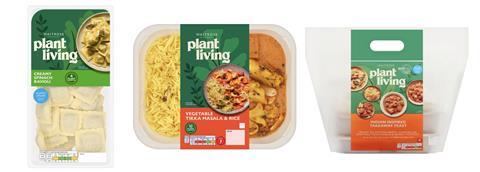
“Our whole campaign last year was focused on pushing people toward fruits and vegetables, but clearly no one remembers that or talked about that, seeing as it seems to have slipped their minds just a year later,” she concludes.
And in the face of criticism surrounding this year’s campaign – which focuses on one of the lower consumer priorities of animal welfare – she is bullish. “I think it goes to show that when you talk about vegetables no one cares – but as soon as you say something slightly more controversial they want you to be talking about vegetables. You really can’t win, can you?”
Roberts, at least, believes Veganuary is taking the right tack. She says the campaign has been “very vocal about making plants the centre of our plate and enjoying UPFs in moderation. Just because we as a brand don’t think it aligns with our messaging any more doesn’t mean it needs to change,” she adds.
Roberts is in an enviable position with her Better Nature brand, in that she specialises in tempeh, a whole food. Better Nature’s sales grew more than five-fold last year [NIQ]. That was in contrast to the majority of alt-meat brands, who are suffering from a problem that runs deeper than Veganuary.
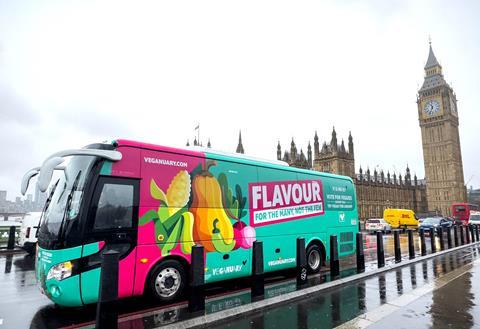
“I don’t think anyone could deny it’s been a very painful couple of years for the meat-free category,” says Roberts. “A lot has come crashing down, but in the rubble, I think we’re seeing some shifts that have needed to happen for a long time.
“Plant-based foods are becoming increasingly normalised and easy to find, product ranges are narrowing, with poor performers being removed, and natural meat-free products like tempeh and tofu are seeing huge growth.”
For Cuddigan of This – one of the few alt-meat brands to grow sales last year – a lot of the issues facing the category come down to “products letting consumers down on taste”. Reformulation has a big part to play here, he says, and could address the UPF debate at the same time.
“Veganuary’s whole campaign last year was focused on pushing people towards fruits and vegetables, but clearly no one remembers that”
Toni Vernelli, Veganuary
Still, taste and health issues are fairly large challenges for brands to tackle, points out Milner. “Neither of these are quick and easy to sort, especially by a fragmented, small and evolving sector that’s struggling to achieve the efficiencies of scale to be financially competitive against the heavily subsidised, well-established behemoth that is animal agriculture,” he says.
“Veganuary undoubtedly has a role to play in this response, as do efforts being planned for a cohesive set of marketing messages and communications that span the sector.”
Valuable insight
Indeed, Vernelli sees support for brands as one of Veganuary’s key roles. Crucially, all of its registered participants are surveyed at the end of their pledge, offering valuable insight to plant-based players.
“We can let brands know which products they liked, which products they didn’t like, where they still feel the market is lacking, how focused they are on health versus taste versus convenience, that type of information. And that’s very useful for brands. They always really appreciate that.”
Ultimately, Vernelli sees any slowdown in Veganuary activity as a sign of its success, rather than the opposite. After all, when it started out in 2014, there were relatively few plant-based products on the supermarket shelves, and going vegan felt like an extreme option. Now, in places such as Germany and the UK, a huge range of plant-based products are available in most areas, affordability of these options is improving and many people are either reducing or thinking about reducing their consumption of animal products.
“So, we might kind of plateau in some countries,” she admits. “But that’s why we’re focusing on other areas of the world. This year we’ve launched campaigns in Peru, Malaysia and Canada. Next year we’ll be looking at adding more countries, particularly in Asia.
“It’s really where we can have the biggest impact, and a lot of those countries are going to be very hard hit by climate change as well, so it’s an issue that people there are quite concerned about, and they’re making diet change already.
“A lot of traditional foods there rely a lot on vegetable ingredients as well, so it’s quite easy to veganise the dishes. And there’s already some messaging coming from the governments. Even the government of China is advocating meat reduction. So it’s fertile ground.”
So rather than losing its steam, in these places, Veganuary will be going full steam ahead.
What are the supermarkets doing for Veganuary?
Veganuary typically prompts a wave of innovation on the supermarket shelves. In past years, retailers have splurged on new plant-based creations, in efforts that were big enough to rival their Christmas showcases.
But this year, innovation has been more muted. The traditional big four have eschewed the usual big bang vegan ranges of the past, instead bringing out a handful of new lines.
“The supermarket Veganuary activity in general is at a lower level than previous years – continuing a trend since probably 2022/23,” says Paul Milner, director of PMMS Consultancy.
Even those who are splurging on Veganuary are taking a slightly different tack. “There’s been less true innovation with more of a spotlight on fruits, vegetables and whole foods,” says Louis Bedwell, business unit lead at the Future Food Movement. “I would say there’s been less product innovation but more marketing innovation.”
Waitrose is a prime example of the above. This year, the retailer has added nine “new and improved products” to its PlantLiving range (pictured below), including Vietnamese-Style Vegetable Pancakes. But the main focus for Waitrose has been its ‘30 plants a week’ campaign, which features prominently in stores. To help consumers get that intake, it has added a ‘plant varieties’ logo to relevant lines.
“Adding the logo to our products takes the brain power away from adding variety to your diet,” says Maddy Wilson, director of own brand, Waitrose.
M&S has also branched out from the usual Veganuary tactics with a wider focus on wellness. This month, it has launched a Brain Food range and functional mushroom drinks.
In fact, the discounters are the only ones to announce the traditional spate of NPD.
Lidl launched 28 new budget-friendly products – from a Meat Free Schnitzel to a Smoked Tofu – with a starting price of £1.09.
Meanwhile, Aldi unveiled its “biggest-ever range of vegan food” for Veganuary, in a bid to make plant-based “more accessible and exciting”. Over a dozen new options hit the shelves on 30 December, including internet sensation Tempura Frickles and a liquid egg replacement, suitable for everything from scrambles to baking.


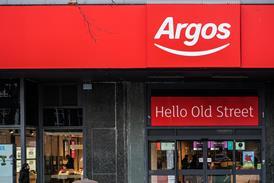






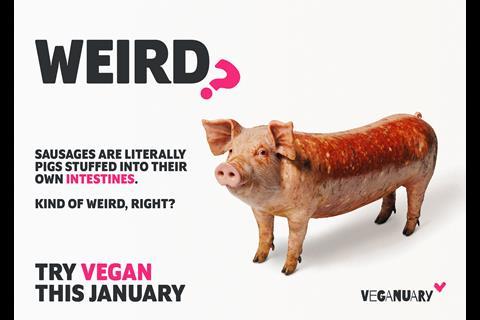
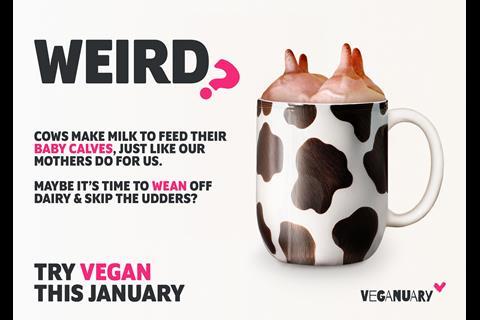

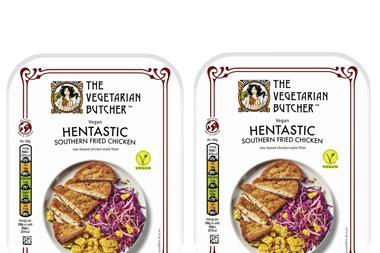
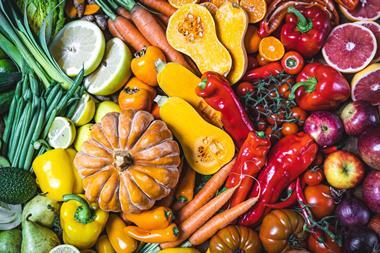









No comments yet